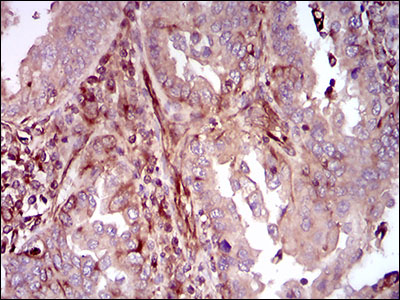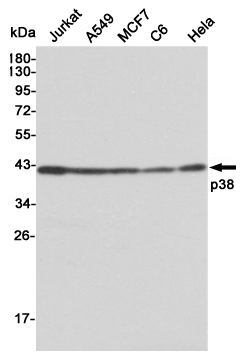-
Product Name
Anti-p38 (6E9) Mouse antibody
- Documents
-
Description
p38 (6E9) Mouse monoclonal antibody
-
Tested applications
WB, IHC-P
-
Species reactivity
Human, Mouse, Monkey, Rat
-
Isotype
Mouse IgG1
-
Preparation
Antigen: Purified recombinant fragment of human MAPK14 (AA: 299-360) expressed in E. Coli.
-
Clonality
Monoclonal
-
Formulation
Purified antibody in PBS with 0.05% sodium azide
-
Storage instructions
Store at 4°C short term. Store at -20°C long term. Avoid freeze / thaw cycle.
-
Applications
WB: 1/500 - 1/2000
IHC: 1/200 - 1/1000
ELISA: 1/10000
-
Validations

Immunohistochemical analysis of paraffin-embedded endometrial cancer tissues using MAPK14 mouse mAb with DAB staining.

Western blot analysis of extracts from Jurkat,A549,MCF7,C6 and Hela cell lysates using p38 mouse mAb (1:1000 diluted).Predicted band size:41KDa.Observed band size:41KDa.
-
Background
Swiss-Prot Acc.Q16539.The protein encoded by this gene is a member of the MAP kinase family. MAP kinases act as an integration point for multiple biochemical signals, and are involved in a wide variety of cellular processes such as proliferation, differentiation, transcription regulation and development. This kinase is activated by various environmental stresses and proinflammatory cytokines. The activation requires its phosphorylation by MAP kinase kinases (MKKs), or its autophosphorylation triggered by the interaction of MAP3K7IP1/TAB1 protein with this kinase. The substrates of this kinase include transcription regulator ATF2, MEF2C, and MAX, cell cycle regulator CDC25B, and tumor suppressor p53, which suggest the roles of this kinase in stress related transcription and cell cycle regulation, as well as in genotoxic stress response. Four alternatively spliced transcript variants of this gene encoding distinct isoforms have been reported.
Related Products / Services
Please note: All products are "FOR RESEARCH USE ONLY AND ARE NOT INTENDED FOR DIAGNOSTIC OR THERAPEUTIC USE"
